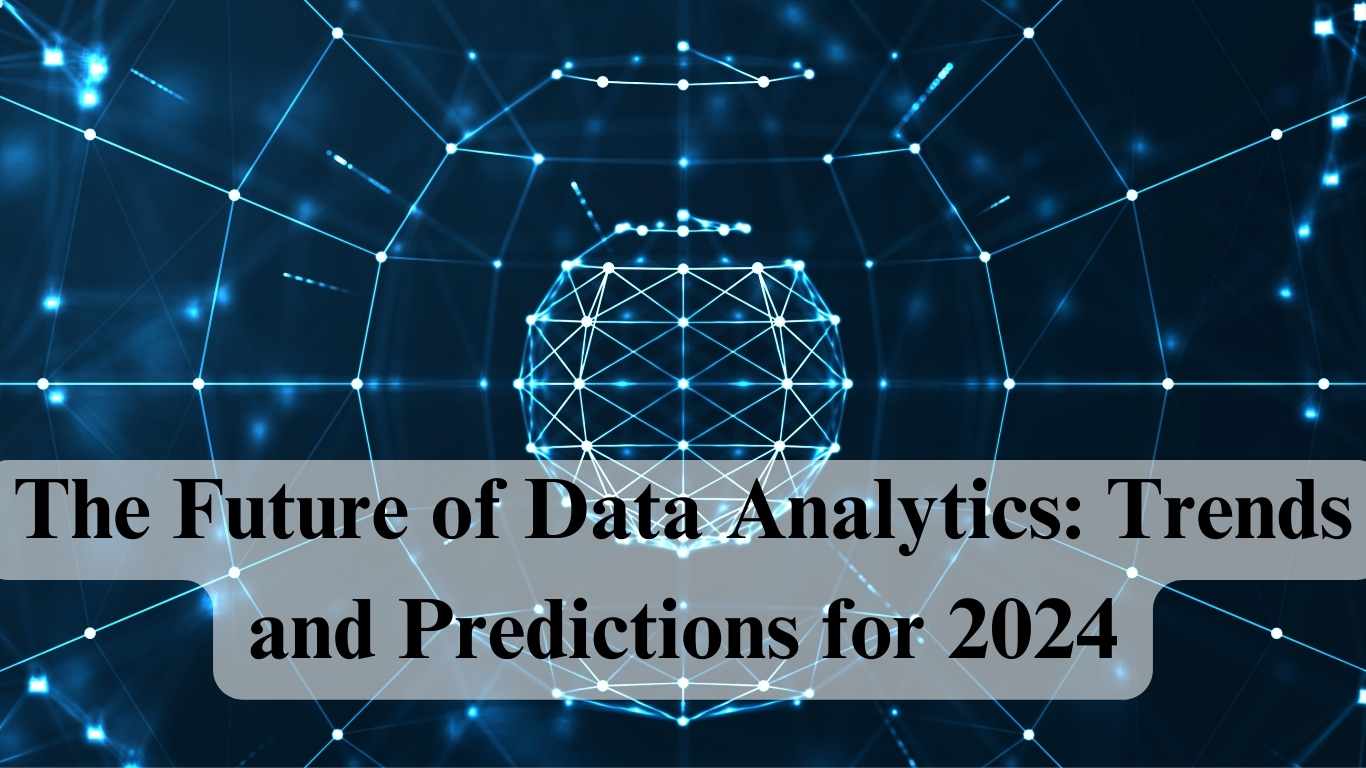Introduction
In the fast-paced realm of data analytics, the future is a landscape of infinite possibilities, shaped by technological advancements, evolving consumer behaviors, and shifting market dynamics. As we stand at the threshold of 2024, the trajectory of data analytics is poised for remarkable transformations, promising a journey marked by innovation, disruption, and boundless potential.
Join us as we embark on a voyage of discovery, peering into the horizon of tomorrow to uncover the insights and opportunities that await. As organizations strive to navigate the complexities of a data-driven world, understanding these trends and predictions will be paramount in charting a course towards success and staying ahead of the curve in an era defined by data.
Rise of Artificial Intelligence and Machine Learning
In 2024, the ascent of artificial intelligence (AI) and machine learning (ML) stands as one of the defining trends in data analytics. Organizations are increasingly harnessing the power of AI and ML technologies to unlock valuable insights from vast datasets, automate decision-making processes, and drive innovation across industries.
AI-powered analytics solutions are revolutionizing traditional data analysis methods by enabling predictive and prescriptive analytics capabilities. Machine learning algorithms can analyze historical data patterns, identify trends, and make accurate predictions about future outcomes, empowering businesses to anticipate market shifts, optimize operations, and enhance customer experiences.
Moreover, AI-driven automation is streamlining data analysis workflows, reducing manual intervention, and improving efficiency. From automating repetitive tasks to optimizing resource allocation and risk management, AI and ML technologies are transforming the way organizations leverage data to gain a competitive edge in the marketplace.
Data Democratization and Self-Service Analytics
Another prominent trend shaping the future of data analytics in 2024 is the democratization of data access and the proliferation of self-service analytics tools. Organizations are increasingly recognizing the importance of empowering business users with the ability to access, analyze, and derive insights from data without the need for specialized technical skills.
Data democratization initiatives aim to break down silos, promote collaboration, and foster a culture of data-driven decision-making throughout the organization. By providing business users with intuitive self-service analytics platforms, organizations can democratize access to data, accelerate decision-making processes, and drive innovation at scale.
However, alongside the benefits of data democratization come challenges related to data governance, privacy, and security. Organizations must implement robust governance frameworks and security measures to ensure data integrity, compliance with regulations, and protection of sensitive information.
In 2024, the democratization of data and the rise of self-service analytics represent a paradigm shift in how organizations approach data analytics. By empowering business users with the tools and capabilities to explore and analyze data autonomously, organizations can unleash the full potential of their data assets and drive sustainable growth in an increasingly data-driven world.
Enhanced Data Privacy and Ethics
In 2024, amidst the data analytics revolution, there’s a heightened focus on data privacy and ethics. With the proliferation of data collection and processing capabilities, concerns surrounding consumer privacy, data security, and ethical use of data have become increasingly prominent.
Regulatory bodies worldwide are implementing stringent regulations, such as the General Data Protection Regulation (GDPR) and the California Consumer Privacy Act (CCPA), to protect individuals’ rights and ensure responsible handling of personal data. Organizations are expected to comply with these regulations, uphold ethical standards, and prioritize data privacy in their analytics practices.
Moreover, there’s a growing emphasis on ethical considerations surrounding the use of AI and ML algorithms. Bias, fairness, transparency, and accountability are critical issues that organizations must address to mitigate potential risks and ensure the ethical use of AI-driven analytics solutions.
By prioritizing data privacy and ethics in their analytics initiatives, organizations can build trust with customers, mitigate regulatory risks, and safeguard their reputations in an increasingly data-sensitive environment.
Real-Time Analytics and Streaming Data
The proliferation of IoT devices, social media platforms, and other digital technologies has led to an explosion of real-time data streams. In 2024, organizations are increasingly leveraging real-time analytics capabilities to harness the value of streaming data and gain actionable insights at the moment.
Real-time analytics enables organizations to monitor and analyze data as it’s generated, allowing for timely decision-making, proactive problem-solving, and immediate responses to emerging trends or events. From detecting anomalies and fraud in financial transactions to optimizing supply chain operations and enhancing customer experiences, real-time analytics has a wide range of applications across industries.
To harness the power of real-time analytics, organizations must invest in technologies and infrastructure that can handle the velocity, volume, and variety of streaming data. This includes implementing scalable data processing frameworks, adopting event-driven architectures, and leveraging cloud-based platforms for real-time data analytics.
Moreover, organizations must prioritize data quality, reliability, and security in their real-time analytics initiatives to ensure the accuracy and integrity of insights derived from streaming data sources.
In summary, real-time analytics and streaming data are reshaping the way organizations derive insights from data, enabling them to make faster, more informed decisions and stay ahead of the curve in a rapidly evolving marketplace.
Augmented Analytics and Natural Language Processing
In 2024, the emergence of augmented analytics powered by natural language processing (NLP) is revolutionizing data analytics workflows. Augmented analytics combines AI and ML technologies with intuitive interfaces and NLP capabilities to automate data preparation, analysis, and insights generation.
NLP allows users to interact with data using natural language queries, enabling non-technical users to access and explore data more intuitively. By simply asking questions in plain language, business users can retrieve relevant insights, generate reports, and make data-driven decisions without the need for specialized technical skills.
Augmented analytics platforms leverage machine learning algorithms to automatically identify patterns, anomalies, and trends in data, providing users with actionable insights in real time. By automating repetitive data analysis tasks and surfacing relevant insights, augmented analytics empowers organizations to accelerate decision-making processes, improve operational efficiency, and drive innovation.
Furthermore, augmented analytics promotes collaboration and knowledge sharing within organizations by democratizing access to insights and fostering a data-driven culture across teams and departments. In 2024, augmented analytics with NLP capabilities is poised to become a game-changer in the field of data analytics, enabling organizations to unleash the full potential of their data and gain a competitive edge in an increasingly data-driven world.
Conclusion
As we peer into the future of data analytics in 2024, it’s evident that organizations are poised to harness the power of emerging technologies and trends to unlock new opportunities and drive innovation. From the rise of artificial intelligence and real-time analytics to the democratization of data and the emphasis on data privacy and ethics, the data analytics landscape is undergoing a profound transformation. In this era of rapid change and disruption, staying ahead of the curve requires a commitment to continuous learning and adaptation. For individuals seeking to thrive in the field of data analytics, investing in education and training is paramount. Enrolling in a Data Analytics course in Noida, Ludhiana, Jaipur, Kochi, etc can provide aspiring data professionals with the knowledge, skills, and practical experience needed to succeed in this dynamic field. Through comprehensive training programs, students can gain hands-on experience with cutting-edge tools and technologies, receive mentorship from industry experts, and build a strong foundation in data analytics principles and methodologies.
By embracing lifelong learning and staying abreast of emerging trends, data professionals in Ludhiana can position themselves for success in an increasingly competitive job market and contribute to driving innovation and growth in their organizations and communities.




Leave a Reply